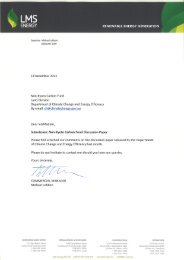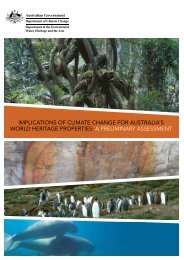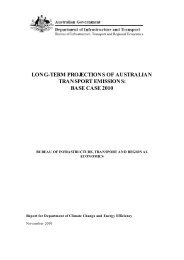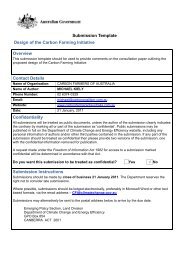Enterprise Agreement 2011-14 - Department of Climate Change
Enterprise Agreement 2011-14 - Department of Climate Change
Enterprise Agreement 2011-14 - Department of Climate Change
Create successful ePaper yourself
Turn your PDF publications into a flip-book with our unique Google optimized e-Paper software.
<strong>Department</strong> <strong>of</strong> <strong>Climate</strong> <strong>Change</strong> and Energy Efficiency – <strong>Enterprise</strong> <strong>Agreement</strong> <strong>2011</strong>-<strong>14</strong><br />
ATTACHMENT B – KEY TERMS<br />
Additional Pay<br />
point<br />
A salary point for Executive Level classifications that are above the normal salary<br />
range. Movement to these pay points are at the discretion <strong>of</strong> the Secretary.<br />
<strong>Agreement</strong> The <strong>Department</strong> <strong>of</strong> <strong>Climate</strong> <strong>Change</strong> and Energy Efficiency (the <strong>Department</strong>)<br />
<strong>Enterprise</strong> <strong>Agreement</strong> <strong>2011</strong> - 20<strong>14</strong><br />
APS the Australian Public Service<br />
EA this <strong>Enterprise</strong> <strong>Agreement</strong><br />
Employee An employee <strong>of</strong> the <strong>Department</strong> <strong>of</strong> <strong>Climate</strong> <strong>Change</strong> and Energy Efficiency and has<br />
the same meaning as the Public Service Act 1999 for ‘APS employee’<br />
Employer means the <strong>Department</strong> <strong>of</strong> <strong>Climate</strong> <strong>Change</strong> and Energy Efficiency Secretary<br />
(Delegate), on behalf <strong>of</strong> the Commonwealth <strong>of</strong> Australia<br />
Excess Employee<br />
Family<br />
An employee is ‘excess’ when:<br />
• they are included in a group <strong>of</strong> employees in the <strong>Department</strong>, comprising a<br />
greater number than is necessary for the efficient and economical working <strong>of</strong> the<br />
<strong>Department</strong>;<br />
• due to technological or other changes in the work methods <strong>of</strong> the <strong>Department</strong>, or<br />
structural or other changes in the nature, extent or organisation <strong>of</strong> the functions<br />
<strong>of</strong> the <strong>Department</strong>; ; or<br />
• the duties usually performed by the employee are to be performed at a different<br />
locality and the employee is not willing to perform those duties at the new locality,<br />
and the Secretary has determined that the employee is excess to the<br />
<strong>Department</strong>’s requirements.<br />
Means a relation by blood, marriage, adoption, fostering or traditional kinship, or a<br />
partner who stands in a bona fide domestic relationship with an employee (without<br />
discrimination as to sexual orientation).<br />
Hard Barrier The top salary point for each classification level. Movement beyond the hard<br />
barrier is through merit selection.<br />
Immediate Family A person who is related by blood, marriage, adoption, fostering or traditional<br />
kinship, has a strong affinity with the employee or a partner who stands in a bona<br />
fide domestic relationship with the employee without discrimination as to sexual<br />
preference.<br />
The following are members <strong>of</strong> an employee’s “Immediate Family”:<br />
a spouse/partner, a child or an adult child, parent, grandparent, grandchild or<br />
sibling <strong>of</strong> the employee;<br />
has a strong affinity with the employee; and<br />
a child or an adult child, parent, grandparent, grandchild or sibling <strong>of</strong> a<br />
spouse/Partner <strong>of</strong> the employee.<br />
56






